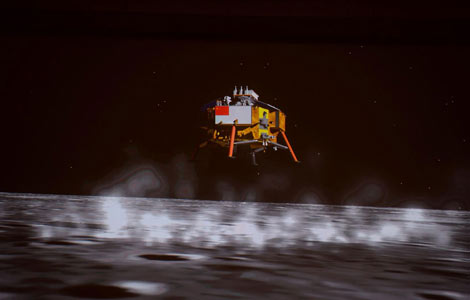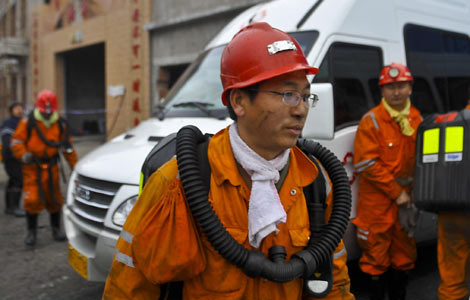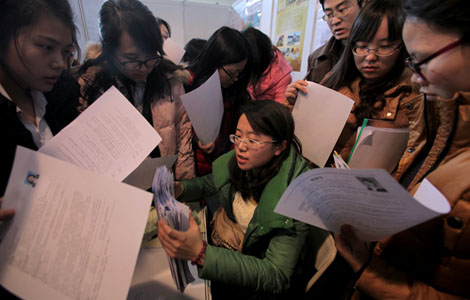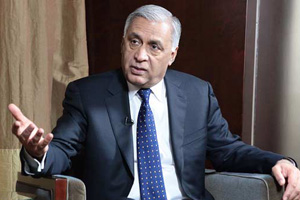UN team finds likely use of chemical weapons in Syria
Updated: 2013-12-14 07:59
By Associated Press at United Nations (China Daily)
|
||||||||
Chemical weapons were probably used in four locations in Syria this year, in addition to the known attack near Damascus in August that forced the government to abandon its secret chemical stockpile, UN inspectors have said.
In a report released Thursday, the experts, led by Swedish professor Ake Sellstrom, examined seven alleged chemical weapons attacks. They concluded that they lacked information to corroborate the allegations at two of the locations.
The inspectors could not determine whether the government or opposition fighters were responsible.
Thursday's report said evidence indicated chemical weapons were probably used in Khan al Assal outside Aleppo; Jobar in the eastern suburbs of Damascus; Saraqueb near Idlib in the northwest; and Ashrafiah Sahnaya in the Damascus countryside. In two cases, it found "signatures of sarin".
The government and opposition have accused each other of using chemical weapons at Khan al Assal. The report said none of the parties in Syria denied their use in that village.
The allegations of chemical weapons use at Jobar and Ashrafiah Sahnaya were made by the Syrian government, while Britain and France raised the allegations about Saraqueb.
In an initial report on Sept 16, Sellstrom's team concluded that evidence collected in the Ghouta area of Damascus following an Aug 21 attack provided "clear and convincing evidence that surface-to-surface rockets containing the nerve agent sarin were used". Graphic video footage showed dozens of people gasping for air and lined-up bodies with no apparent injuries. The US government said more than 1,400 people were killed.
The confirmed use of chemical weapons in Ghouta, and the threat of possible US military action, led to a US-Russian agreement to eliminate Syria's chemical weapons by 2014. The process of getting chemicals that can be used to make weapons out of Syria is currently underway.
The experts said they collected "credible information that corroborates the allegations that chemical weapons were used in Khan al Assal on March 19 against soldiers and civilians".
The report said information from medical, military and health personnel corroborated a rapid mass poisoning "by an organophosphorous compound".
But the inspectors said the release of chemical weapons at the site could not be independently verified because they lacked "primary information" on how the chemical agents were delivered, and because environmental and medical samples were not scientifically collected, preserved and analyzed.
The UN mission said it collected evidence "consistent with the probable use of chemical weapons in Jobar" on Aug 24. The attack was carried out on a relatively small scale against soldiers, it said.
But the mission said it lacked information on the delivery system and the inspectors therefore could not establish a link "between the victims, the alleged event and the alleged site".
The report said Jobar was "compromised by previous de-mining activities and by visits of representatives of the Syrian government who had reportedly moved the remnants of two explosive devices alleged to be the munitions used in the incident". The UN team was able to examine those remnants at a storage location.

(China Daily 12/14/2013 page7)

 After the storm
After the storm
 Mandela's body transferred to Qunu village
Mandela's body transferred to Qunu village
 Illustration: Chang'e-3 soft-lands on moon
Illustration: Chang'e-3 soft-lands on moon
 Guangzhou beats Al-Ahly 2-0 at Club World Cup
Guangzhou beats Al-Ahly 2-0 at Club World Cup
 Two students wounded in US school shooting
Two students wounded in US school shooting
 21 died in Xinjiang coal mine explosion
21 died in Xinjiang coal mine explosion
 Postgraduates get hard lessons at job fair
Postgraduates get hard lessons at job fair
 Lippi confident with Guangzhou's opener
Lippi confident with Guangzhou's opener
Most Viewed
Editor's Picks

|

|

|

|

|

|
Today's Top News
UN slams deadly attack on peacekeepers in Mali
China's 'Jade Rabbit' rolls to moon surface
Statement singles out China's ADIZ
US paves way for in-flight cell phones
Urbanization plan outlined
ASEAN cautious on air zone debate
Leaders vow to steer steady path
BYD dismisses 'inaccurate and misleading' reports
US Weekly

|

|






